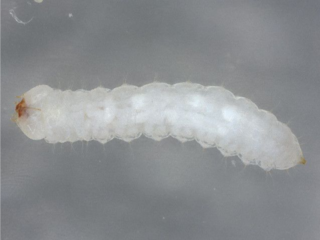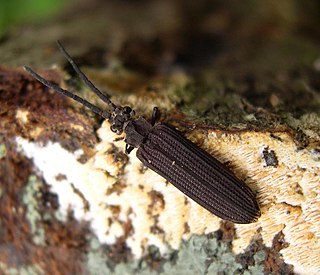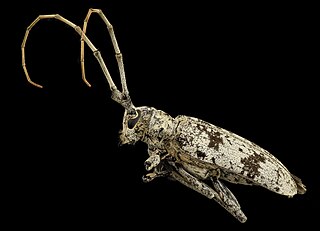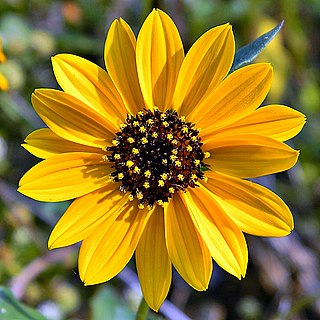
The telephone-pole beetle is a beetle native to the eastern United States and the only living representative of the otherwise extinct family Micromalthidae. Larvae of the beetle live in decaying wood and can be pests to wooden structures, lending them their common name, the 'telephone-pole beetle.'

The Archostemata are the smallest suborder of beetles, consisting of 50 living species in five families and over 200 described fossil species. They are an ancient lineage with a number of primitive characteristics. Antennae may be thread-shaped (filiform) or like a string of beads (moniliform). This suborder also contains the only beetles where both sexes are paedogenic, Micromalthus debilis. Modern archostematan beetles are considered rare, but were more diverse during the Mesozoic.

Neochen is a genus of birds in the family Anatidae.

The North American green toad is a species of toad found in the southwestern United States in the states of Arizona, New Mexico, Colorado, Kansas, Oklahoma and Texas, as well as in northern Mexico in the states of Tamaulipas, San Luis Potosí, Durango, and Zacatecas. It is commonly called green toad.

Eremophila debilis, the winter apple or amulla, is a flowering plant in the figwort family Scrophulariaceae, and is endemic to an area extending from north Queensland to near the border between New South Wales and Victoria in Australia. It is a prostrate shrub with elliptic to lance-shaped or egg-shaped leaves and white, rarely deep mauve flowers.

Goes is a genus of longhorn beetles, containing the following species:

Stachys debilis is a species of flowering plant in the family Lamiaceae. It is found only in Ecuador. Its natural habitats are subtropical or tropical moist montane forests, subtropical or tropical high-altitude shrubland, and subtropical or tropical high-altitude grassland.
Isthmohyla debilis is a rare species of frog in the family Hylidae. It occurs in the Atlantic slopes of the Cordillera Central and Cordillera Talamanca in Costa Rica and western Panama as well as on the Pacific slopes in southwestern Panama. Common name Isla Bonita treefrog has been suggested for it.

The lowland tiny greenbul, is a species of songbird in the bulbul family, Pycnonotidae. It is found in eastern Africa. Its natural habitats are subtropical or tropical moist lowland forest and subtropical or tropical moist shrubland.

Parietaria debilis, commonly known as pellitory, small-flower pellitory, or native pellitory, is a herb native to Australia and New Zealand.
Plantago debilis is a species of herb native to Australia. Common names include shade plantain and weak plantain.

Crowsoniella is a genus of beetles in the order Archostemata. It contains only a single species, Crowsoniella relicta, and is the only member of the monotypic family Crowsoniellidae. It is known only from three male specimens collected in 1973 in the Lepini mountains of central Italy by Roberto Pace. In a degraded pasture, the beetles were found among the roots of a large hawthorn tree, in deep calcareous soil. No other specimens have been found since.

Byasa alcinous, the Chinese windmill, is a butterfly of the family Papilionidae.

Copelatus debilis is a species of diving beetle. It is part of the genus Copelatus of the subfamily Copelatinae in the family Dytiscidae. It is found in Central America and North America. It was described by Sharp in 1882.

Prosopalpus debilis, the western dwarf skipper, is a butterfly in the family Hesperiidae. It is found in Senegal, Guinea, Sierra Leone, Liberia, Ivory Coast, Ghana, western Nigeria, Cameroon, Gabon, Ethiopia, north-western Tanzania and northern Zambia. The habitat consists of forests.

Helianthus debilis is a species of sunflower known by the common names cucumberleaf sunflower, beach sunflower, weak sunflower, and East Coast dune sunflower. It is native to the United States, where it can be found along the Atlantic and Gulf Coasts. It is known elsewhere as an introduced species, such as South Africa, Australia, Taiwan, Slovakia, and Cuba.

Oxalis debilis, the large-flowered pink-sorrel or pink woodsorrel, is a perennial plant and herb in the family Oxalidaceae. Its original distribution is South America but has become a very cosmopolitan species, occurring in all continents except Antarctica. It can be found in both temperate and tropical areas.

Palmerella is a genus of plants in the family Campanulaceae. It has only one known species, Palmerella debilis, long known by the synonym Lobelia dunnii. It is native to 8 counties in southern California plus the northern part of Baja California.

Microtea, the jumby peppers, are a genus of flowering plants in the family Microteaceae, native to the Caribbean islands, Central America, and South America.















